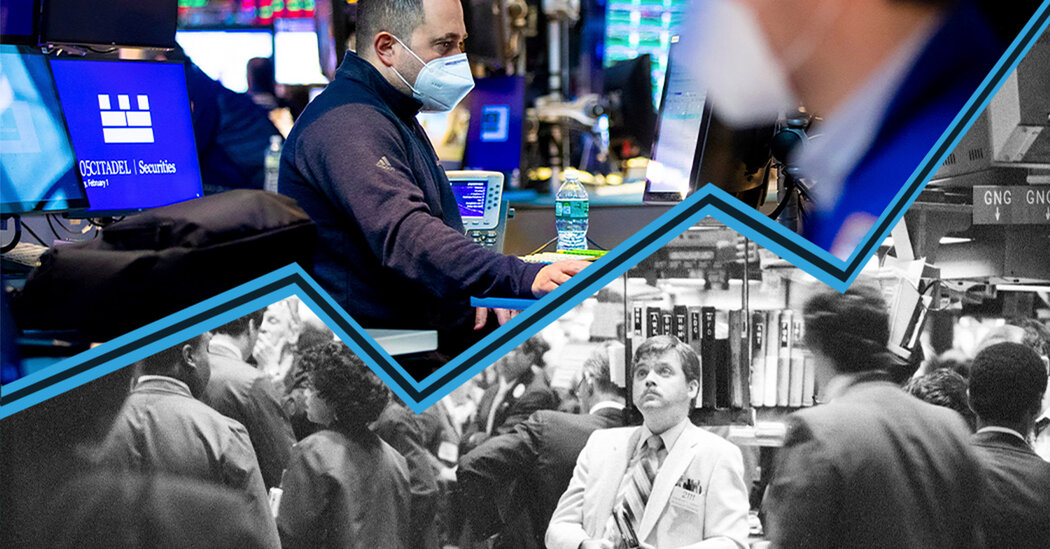The book documented the reckless, frat-guy culture of investment banking in the 1980s. DealBook talked with Mr. Lewis about how Wall Street has (and hasn’t) changed since.
The DealBook newsletter delves into a single topic or theme every weekend, providing reporting and analysis that offers a better understanding of an important issue in business. If you don’t already receive the daily newsletter, sign up here.
In 1989, a 29-year-old Michael Lewis published the groundbreaking book “Liar’s Poker,” a telling narrative about his time as a bond salesman at Salomon Brothers in the late 1980s. More than 30 years later, it remains required reading on Wall Street.
“Liar’s Poker” launched Mr. Lewis’s writing career, leading to more than a dozen books, many about business, including “The Big Short.”
Now, Mr. Lewis, who said that until recently he hadn’t reread his original effort since it was published, is revisiting it and everything that has happened over the past three decades on Wall Street in a new podcast called “Other People’s Money,” which will be released next week. He has also recorded a new audiobook version of “Liar’s Poker.”
I’ve known Mr. Lewis for more than 15 years. He’s been a hero to me: I read “Liar’s Poker” when I first started my career as a financial journalist, and it opened up my eyes to just how much fun writing about finance could be. While I never found writing easy, I always envisioned him playing the keyboard like a piano, with a wide grin on his face.
This week, we spoke about the state of Wall Street and the impact of “Liar’s Poker” on its culture. The interview has been edited for clarity.
DealBook: When you wrote “Liar’s Poker,” what kind of impact did you think it would have? What did you think was going to happen to Wall Street?
I vividly thought that I was trying to describe Brigadoon. It could never survive. They were willing to pay me probably millions of dollars, but certainly hundreds of thousands, to dish out financial advice when I certainly didn’t know what you should be doing with your money. I just thought, this is impossible. It felt like the end of an era. Michael Milken was going to jail. It was like one thing after another. Society is going to get its arms around Wall Street. And this financialization business is going to stop or be slowed. I was wrong about that.
It may not have ended. But do you think it changed?
The place tolerated a range of human behavior and a range of character that corporations don’t today. The corporate culture was almost anything goes and there was a delight in that, especially for someone writing about it. There wasn’t anything quite like Salomon Brothers then. Now it’s all been kind of flattened into this gray. I think there are characters like Jamie Dimon who would have fit very comfortably on the Salomon trading floor. But I think the environment has changed.
The sound and the smell and the kind of taste of the place seems to have changed. I’ve walked onto a big hedge fund trading floor, and they’re completely silent. They’re just guys and women staring at screens and doing things with their computers. It’s such a different environment, even though maybe the underlying relationship to the rest of the society hasn’t changed.
It seemed to me that your book was an indictment of Wall Street but may have had the opposite effect. Oliver Stone’s “Wall Street” was supposed to be an indictment, too, but everybody wanted to be Gordon Gekko.
Yeah. I know. And I didn’t quite see that coming. For me, it was like just a gas to write. They were kind of funnier on the page than they were in real life. I guess I should have anticipated that mainly what a young person was going to get from this was how much fun Wall Street was.
Personally, do you have a positive or negative impression of Wall Street?
I can’t say I don’t like Wall Street people. I love some of them. But I think the system is perpetually screwed up, and I don’t quite understand why, except that people get themselves in positions of influence and they’re able to make money from a screwed up system. I think of it as morally neutral. If they’re incentivized properly, they tend to do things that are more or less in the interest of everybody else. And if they’re incentivized badly, they don’t.
As a storyteller, what do you think of today’s set of characters?
My impression is that technology has made the characters somehow a little less rich. It’s more like there’s a flatness to it that technology has encouraged. The old characters of that era were sort of smashing the aisles. They were disrupting Wall Street in all kinds of ways.
Is Robinhood a company doing that now?
I’m not sure what Robinhood upends — preserving both a fiction and the guts of a screwed up stock market without making a real dent on anything meaningful. And the fiction is that people can go into the market and systematically beat the market and you should be doing this with your money. I understand it’s fun if you’re treating it like a casino. It is not a very healthy one. I think of Vanguard as being more useful, disruptive than Robinhood, teaching people not to do that.
Do you think journalists should be trying to protect small investors? Many retail investors now say they want to take risks. They want a chance at the lottery ticket.
I never really felt the need to protect that kind of person from himself. I figured nature will take its course. The reflex of the old small investor was “how come you didn’t protect me,” right? There is maybe more of a libertarian streak in the loudest of the punters in the stock market.
And then there are characters like Elon Musk upending all sorts of things. Walter Isaacson is now apparently going to write his biography.
Look, if Elon Musk invited me to ride shotgun with him, of course I would. I just don’t think he would. I don’t think I’m the writer he has in mind.
Are you surprised the book is often required reading for new employees on Wall Street today?
No boss on Wall Street was making their employees read “Liar’s Poker” in 1990. It was like, you’re not supposed to read that. Now it’s become a kind of weird manual.
What do you think? How has Wall Street changed since the 1980s? Let us know: dealbook@nytimes.com.


























